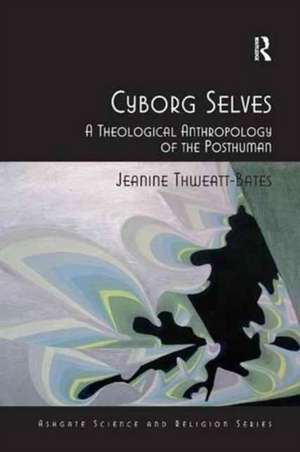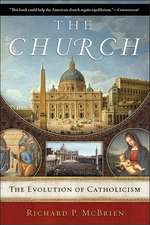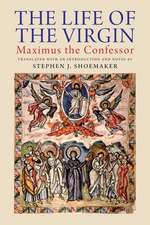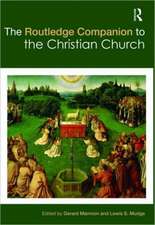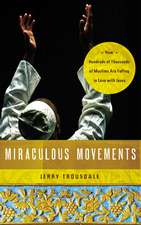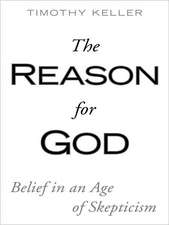Cyborg Selves: A Theological Anthropology of the Posthuman: Routledge Science and Religion Series
Autor Jeanine Thweatt-Batesen Limba Engleză Paperback – 15 noi 2016
| Toate formatele și edițiile | Preț | Express |
|---|---|---|
| Paperback (1) | 476.86 lei 6-8 săpt. | |
| Taylor & Francis – 15 noi 2016 | 476.86 lei 6-8 săpt. | |
| Hardback (1) | 1113.12 lei 6-8 săpt. | |
| Taylor & Francis – 22 mai 2012 | 1113.12 lei 6-8 săpt. |
Din seria Routledge Science and Religion Series
-
 Preț: 325.11 lei
Preț: 325.11 lei -
 Preț: 311.41 lei
Preț: 311.41 lei -
 Preț: 303.94 lei
Preț: 303.94 lei -
 Preț: 311.41 lei
Preț: 311.41 lei -
 Preț: 312.34 lei
Preț: 312.34 lei -
 Preț: 309.59 lei
Preț: 309.59 lei - 12%
 Preț: 301.41 lei
Preț: 301.41 lei - 18%
 Preț: 1000.27 lei
Preț: 1000.27 lei -
 Preț: 381.00 lei
Preț: 381.00 lei -
 Preț: 436.14 lei
Preț: 436.14 lei -
 Preț: 432.12 lei
Preț: 432.12 lei - 18%
 Preț: 903.36 lei
Preț: 903.36 lei -
 Preț: 469.34 lei
Preț: 469.34 lei -
 Preț: 389.38 lei
Preț: 389.38 lei -
 Preț: 389.66 lei
Preț: 389.66 lei -
 Preț: 444.62 lei
Preț: 444.62 lei -
 Preț: 384.02 lei
Preț: 384.02 lei - 18%
 Preț: 1059.45 lei
Preț: 1059.45 lei - 17%
 Preț: 259.98 lei
Preț: 259.98 lei - 18%
 Preț: 1054.71 lei
Preț: 1054.71 lei - 13%
 Preț: 338.33 lei
Preț: 338.33 lei - 26%
 Preț: 1016.36 lei
Preț: 1016.36 lei -
 Preț: 469.34 lei
Preț: 469.34 lei - 18%
 Preț: 1059.45 lei
Preț: 1059.45 lei - 25%
 Preț: 770.98 lei
Preț: 770.98 lei - 18%
 Preț: 1114.30 lei
Preț: 1114.30 lei -
 Preț: 381.47 lei
Preț: 381.47 lei -
 Preț: 489.26 lei
Preț: 489.26 lei - 18%
 Preț: 1061.93 lei
Preț: 1061.93 lei - 18%
 Preț: 998.08 lei
Preț: 998.08 lei - 18%
 Preț: 888.12 lei
Preț: 888.12 lei - 18%
 Preț: 1112.03 lei
Preț: 1112.03 lei -
 Preț: 383.71 lei
Preț: 383.71 lei - 18%
 Preț: 1054.71 lei
Preț: 1054.71 lei
Preț: 476.86 lei
Nou
Puncte Express: 715
Preț estimativ în valută:
91.26€ • 95.15$ • 75.84£
91.26€ • 95.15$ • 75.84£
Carte tipărită la comandă
Livrare economică 20 martie-03 aprilie
Preluare comenzi: 021 569.72.76
Specificații
ISBN-13: 9781138261150
ISBN-10: 1138261157
Pagini: 224
Dimensiuni: 156 x 234 x 14 mm
Greutate: 0.32 kg
Ediția:1
Editura: Taylor & Francis
Colecția Routledge
Seria Routledge Science and Religion Series
Locul publicării:Oxford, United Kingdom
ISBN-10: 1138261157
Pagini: 224
Dimensiuni: 156 x 234 x 14 mm
Greutate: 0.32 kg
Ediția:1
Editura: Taylor & Francis
Colecția Routledge
Seria Routledge Science and Religion Series
Locul publicării:Oxford, United Kingdom
Notă biografică
Jeanine Thweatt-Bates holds a Ph.D. in Theology and Science from Princeton Theological Seminary, and is currently Assistant Professor of Theology at New Brunswick Theological Seminary and an instructor with the Science for Ministry Institute at Princeton Theological Seminary.
Recenzii
'In her thoroughly researched and highly interesting book, Dr Thweatt-Bates explores the challenges and implications of transhumanism for Christian theological discourse. Her work is an important and notable contribution, and testimony to the fact that theological reflection is not always an afterthought. Thweatt-Bates' reflections provide food for future thought on what it means to be human when facing the new problems that transhumanism in various forms presents to us.' Jan-Olav Henriksen, Norwegian School of Theology, Oslo 'Christian thinkers have paid virtually no attention to the post-human future of cyborg selves. That future is a technological and medical inevitability so theologians and ethicists had better get up to speed, and quickly. Cyborg Selves is the perfect book to get them started on understanding the meaning of a post-human future for Christian theology.' Wesley J. Wildman, Professor of Philosophy, Theology, and Ethics, Boston University ’Thweatt-Bates has opened up a significant area of conversation between various contextual theologies and posthumanism and has done some significant work in contributing to this dialogue. The text would be very useful for anyone wanting to be introduced to posthumanism and the many theological and philosophical issues at play in the conversation today.’ Journal of Religion, Media and Digital Culture
Cuprins
Introduction; Chapter 1 The Cyborg Manifesto; Chapter 2 The Transhumanist Manifesto; Chapter 3 Post-Anthropologies; Chapter 4 Theological Anthropologies; Chapter 5 Constructing a Theological Post-Anthropology; Chapter 6 Christology and the Posthuman;
Descriere
What is the 'posthuman'? Is becoming posthuman inevitable - something that will happen to us, or something we will do to ourselves? Why do some long for it, while others fearfully reject it? This book aims to clarify current theological and philosophical dialogue on the posthuman by arguing that theologians must pay attention to which form of the posthuman they are engaging, and to demonstrate that a 'posthuman theology' is not only possible, but desirable, when the vision of the posthuman is one that coincides with a theological vision of the human.
